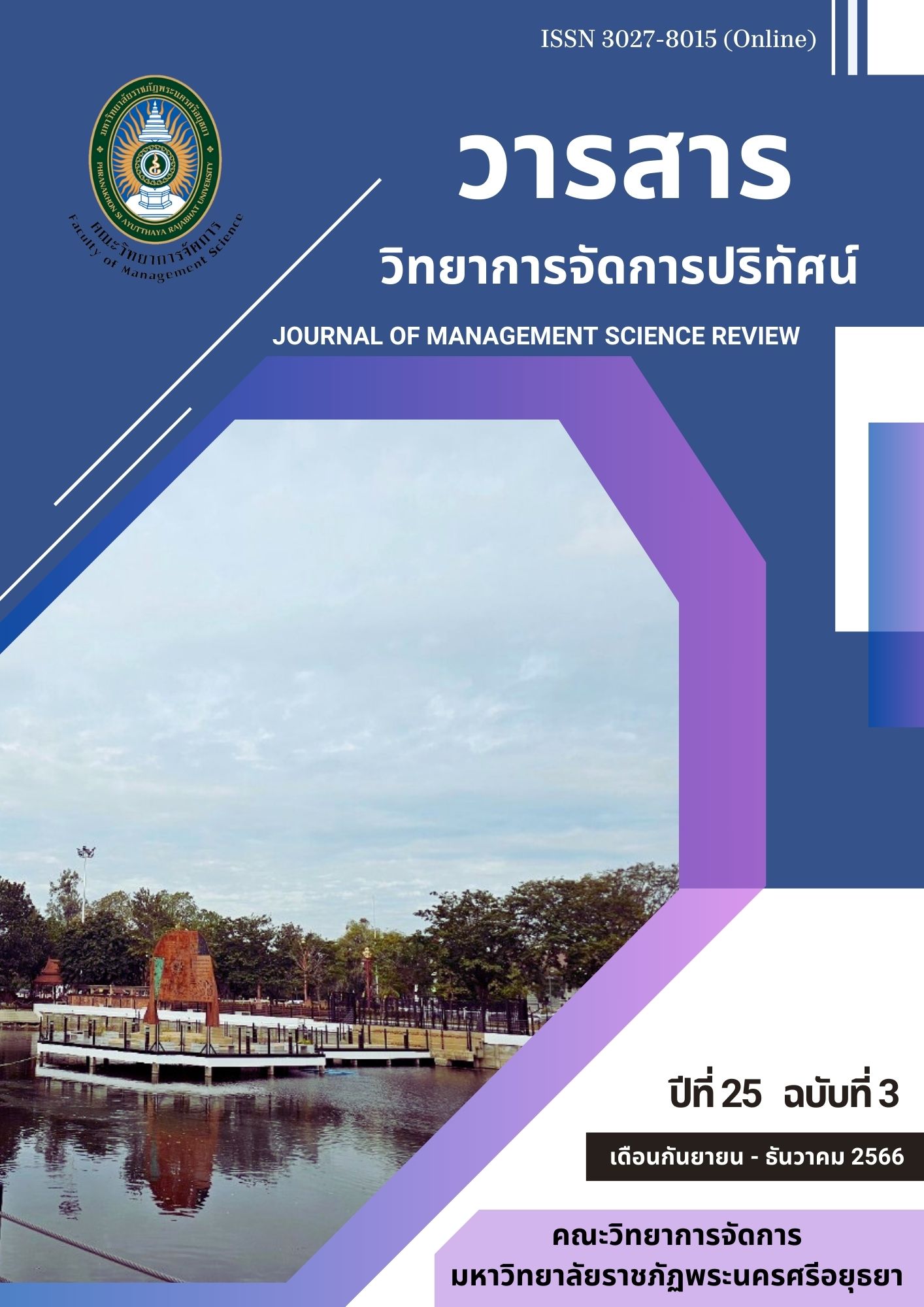แนวทางในการรับมือกับพฤติกรรมผู้บริโภคที่เปลี่ยนแปลงหลังจากวิกฤตการณ์โควิด-19 ของผู้ประกอบการธุรกิจโรงแรมในกรุงเทพมหานครและปริมณฑล
คำสำคัญ:
พฤติกรรมผู้บริโภค, การรับรู้ความเสี่ยง, การยอมรับนวัตกรรม, ผู้ประกอบการธุรกิจโรงแรมบทคัดย่อ
การวิจัยนี้มีวัตถุประสงค์เพื่อศึกษาอิทธิพลของปัจจัยด้านทัศคติ การรับรู้ความเสี่ยง การรับรู้ประโยชน์ และการยอมรับนวัตกรรมที่ส่งผลต่อพฤติกรรมผู้บริโภคที่เปลี่ยนแปลงหลังจากวิกฤตการณ์โควิด-19 และเพื่อศึกษาแนวทางในการรับมือกับพฤติกรรมผู้บริโภคที่เปลี่ยนแปลงหลังจากวิกฤตการณ์โควิด-19 ของผู้ประกอบการธุรกิจโรงแรมในกรุงเทพมหานครและปริมณฑล การวิจัยนี้เป็นงานวิจัยแบบผสมผสานวิธี ซึ่งใช้แบบสอบถามแบบออนไลน์เป็นเครื่องมือเก็บข้อมูลจากผู้บริโภคที่ใช้บริการเข้าพักโรงแรมในเขตกรุงเทพมหานครและปริมณฑล จำนวน 400 คน ผู้วิจัยใช้โมเดลสมการโครงสร้าง (Structural equation modeling : SEM) ในการวิเคราะห์ข้อมูล ส่วนการวิจัยเชิงคุณภาพผู้ให้ข้อมูลสำคัญใช้การสัมภาษณ์เชิงลึกจากผู้บริหารธุรกิจโรงแรมในเขตกรุงเทพและปริมณฑล จำนวน 17 คน
ผลการวิจัยพบว่า ปัจจัยด้านการรับรู้ประโยชน์ การรับรู้ความเสี่ยง การยอมรับนวัตกรรมและทัศนคติ มีอิทธิพลทางตรงต่อพฤติกรรมผู้บริโภคที่เปลี่ยนแปลงหลังจากวิกฤตการณ์โควิด-19 (มีค่าเท่ากับ 0.64 , 0.13 , 0.12 และ 0.11 ตามลำดับ) ตามลำดับ ผลการตรวจสอบความสอดคล้องโมเดลเชิงสาเหตุของปัจจัยด้านทัศคติ การรับรู้ความเสี่ยง การรับรู้ประโยชน์ และการยอมรับนวัตกรรมที่ส่งผลต่อพฤติกรรมผู้บริโภคที่เปลี่ยนแปลงหลังจากวิกฤตการณ์โควิด-19 ได้ค่า=36.760, df= 38, /df=0.937, p-value=0.527, RMSEA=0.000, RMR=0.005, GFI=0.99, AGFI=0.96, NFI= 0.99, IFI=1.00 ซึ่งสอดคล้องกับข้อมูลเชิงประจักษ์ แนวทางในการรับมือพฤติกรรมผู้บริโภคที่เปลี่ยนแปลงหลังจากวิกฤตการณ์โควิด-19 ผู้ประกอบการธุรกิจโรงแรมควรใช้เทคโนโลยีที่ทันสมัยเพื่อบริหารจัดการโรงแรม เช่น ระบบอัตโนมัติผ่านช่องทางออนไลน์ การสอบถามหรือแจ้งปัญหาผ่านแชตบอท การให้คำแนะนำข้อมูลออนไลน์ การเช็กอินเเละเช็กเอาต์ผ่านระบบแอปพลิเคชัน เพื่อรองรับความต้องการของผู้บริโภคที่มีหลากหลาย
เอกสารอ้างอิง
Assael, H. (2004). Consumer Behavior: A Strategic Approach. Boston: Houghton Mifflin.
Demirdogen, O., Yaprakli, S., Yilmaz, M. K., & Husain, J. (2010). Customer Risk Perceptions of Internet Banking – A Study In Turkey. Journal of Applied Business Research (JABR), 26(6), 57-68.
Hoyer, W. D., & Macinnis, D. J. (2007). Consumer Behavior. Boston: Houghton Mifflin.
Jiravibhusetha, R. (2021). Factors affecting consumer's buying behavior of ready-to-eat food products in the digital era. Journal of MCU Loei Review, 2(2), 102-114.
Joreskog, K. G., & Sorbom, D. (1993). LISREL 8: Structural equation modeling with the SIMPLIS command language. Chicago: Scientific Software International.
Kalimullah, K., & Sushmitha, D. (2017). Influence of Design Elements in Mobile Applications on User Experience of Elderly People. Procedia Computer Science, 113(1), 352-359.
Sharma, K., Kumar, Y., & Khosla, R. (2022). Perceived Risk a Factor Influencing Online Shipping Consumer's Psychological Behavior: A Study of Karnal. Journal for ReAttach Therapy and Developmental Diversities, 6(1s), 87-92.
Kotler, P. (2009). Marketing management: analysis, planning implementation and control. New Jersey: Pearson Education.
Lindeman, R. H., Merenda, P. F., & Gold, R. Z. (1980). Introduction to bivariate and multivariate analysis. Glenview, Illinois: Scott, Foresman and Company.
Pongpukdee, N., & Pongpukdee, S. (2021). Know How to Survive Hotel Business Solution. Journal of Roi Kaensarn Academi, 6(6), 358-369.
Potimas, P., & Ngarmsak, T. (2023). A Study of the Attitude toward Behavior, Subject Norm and Perceived Behavior Control that Affect the Purchase Intention of Dietary Supplements of the Consumers in Khon Kaen Municipality. Journal of Modern Learning Development, 8(5), 49-63.
Rogers, E. M., & Shoemaker, F. F. (1962). Communication of innovation: A cross–cultural approach. 2 nd ed.. New York: The Free Press.
Seedokbuab, P., & Wongrat, K. (2022). The Influence of Employee Experience Value Acquisition and Innovation Acceptance on Brand Value Acceptance and Loyalty among Generation Y Customers of a Commercial Bank in Phetchaburi Province. Academic Journal of Phetchaburi Rajabhat University, 12(3), 136-148
Srihirun, J. et al. (2022). Digital Marketing Innovation of Hotel Business. Journal of Marketing and Management, 9(2), 1-16.
Steadmon, C. E., & Kasavana, M. L. (1988). Managing Front Office Operations. 2 nd ed.. Michigan: Richard D. Irwin.
Terblanche, N.S., & Taljaard, A. (2018). The perceived value and perceived benefits experienced by customers using travel agents. South African Journal of Business Management, 49(1), a7.
UNWTO World Tourism Barometer. (2020). WORST YEAR IN TOURISM HISTORY WITH 1 BILLION FEWER INTERNATIONAL ARRIVALS. Retrieved February 1, 2023, From https://www.unwto.org/news/2020-worst-year-in-tourism-history.
WHO Thailand. (2021). Coronavirus disease (COVID-19) questions and answers (general). Retrieved February 1, 2023, From www.who.int/thailand/emergencies/q-a-on-covid-19-general.
Wongprateep, N., & Boonyanmethaporn, W. (2023). Resilience Strategies Service Quality for Business Survival in COVID-19 Pandemic Small Hotels Boutique Lanna Chiang Mai Province. Rajapark Journal, 17(51), 48-65.
Wongrattana, C. (2010). Technique Using Statistics for Research. Bangkok: Tepneramit Printing.
World Health Organization. (2020). Coronavirus disease (COVID-19) pandemic. Retrieved February 1, 2023, From https://www.who.int/emergencies/diseases/novel-coronavirus-2019.





